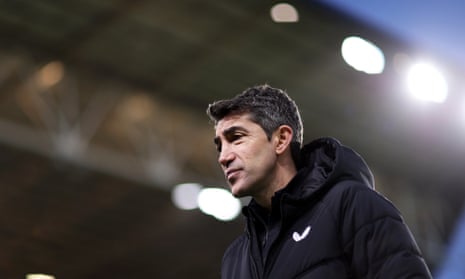In the midst of questionable match postponements, relegation scraps and Manchester City having basically wrapped up the Premier League title by mid-January, Wolves have been moving up the table quietly and effectively. A 3-1 win over Southampton on Saturday extended their unbeaten run to four games, taking them up to eighth. They are now just six points off fourth-placed West Ham, with two games in hand.
Even though Nuno Espírito Santo had a disappointing final season at Molineux, finishing 13th in the league after three straight defeats at the end of the campaign, the appointment of Bruno Lage as his successor felt underwhelming. Lage had been out of work for a year following his time at Benfica and Wolves fans must have worried about his lack of experience in top-flight management. He has been coaching teams for 25 years but often at youth level or as an assistant manager – as he was for Carlos Carvalhal at Sheffield Wednesday and Swansea City.
Yet Wolves took a leap of faith in Lage, in part due to their links with the agent Jorge Mendes, and that risk is being rewarded. Wolves started the season slowly, losing their first three games 1-0 to Leicester, Tottenham and Manchester United. Wolves had more shots than their opponents in all three of those matches, but they could not find the finishing touch and it proved costly.
Scoring goals has been aproblem for the team this season. They do not shoot with great regularity – only Norwich (10.2 per game) have taken fewer shots than Wolves (10.3 per game) in the league; only the relegation-threatened pair Norwich (10) and Burnley (16) have scored fewer goals than Wolves (17); and only Norwich have a worse conversion rate – they are scoring with 4.2% of their shots compared to 7.8% for Lage’s side.
The 3-1 win on Saturday was the first time Wolves have scored three goals in a league game at Molineux since they beat Everton 3-0 in July 2020, some 29 matches ago. There is still plenty of work to be done in the final third, particularly given that their joint-top scorers this season, Hwang Hee-Chan and Raúl Jiménez, have scored just four goals each. Hwang is on an eight-game run without a goal and Jiménez only recently ended a six-game goalless streak.
What has aided Wolves, though, has been their resolute defence. Opponents are struggling to break down Lage’s side, with only Manchester City (13) conceding fewer goals in the league than Wolves (15). The Wolves defence has made a marked improvement under Lage. They conceded 1.39 goals per game last season and that number is now down to just 0.75. Wolves kept eight clean sheets in the first half of this season – just two fewer than their total of 10 in the whole of last season.
José Sá, who played under Lage at Benfica, has been a great addition. The Portuguese goalkeeper has the best save success rate (80%) in the Premier League this season. The 29-year-old has been a solid last line of defence (unless facing James Ward-Prowse from 30 yards) and he has quickly forged a relationship with the back three in front of him.
Like Nuno for much of his time at Wolves, Lage has picked a three-man backline and his consistency in selection has helped this nigh-on watertight defence. Max Kilman, Conor Coady and Romain Saïss started together in Wolves’ first 19 games of the season before Saïss joined up with his Morocco teammates for the Africa Cup of Nations.
In front of them, the midfield partnership of João Moutinho and Rúben Neves break up play, dictate the tempo and spread the play to the wing-backs, who push on and stretch opponents, with Leander Dendoncker an additional option to rotate with Neves or to beef up the midfield depending on the opposition. It’s a similar system to the one that worked well under Nuno before he tinkered with the setup in his final year at the club.
Wolves had stagnated under Nuno, but Lage has injected a new lease of life into the squad. He has only used 20 players this season, which could be an issue later in the season as wear and tear leads to more injuries, but the intensity he has brought to the team is really starting to pay off.
The signing of the young Portuguese winger Chiquinho this week has boosted his attacking options further, though his arrival may be a precursor to the exit of Adama Traoré. Even still, Pedro Neto – the club’s joint top scorer last season – will be returning from injury soon.
There was understandable scepticism surrounding Lage’s appointment last summer, but he has won over the doubters quickly. With a little more composure in front of goal, Wolves should be a real force over the coming months.

Comments (…)
Sign in or create your Guardian account to join the discussion